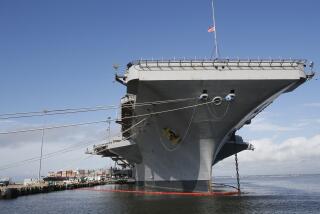All Hands: Handle With Care
- Share via
The U.S. Navy has been a part of Seal Beach for more than half a century, loading ammunition onto ships at the Naval Weapons Station and readying them to sail into harm’s way.
The dangerous business of handling shells, missiles and other explosives usually falls to civilian employees of the Navy. The possibility that the service might take the job away from those workers and give it to whatever company submits the lowest bid is worth examining closely.
The Navy is considering seeking private-sector bids for much of its ordnance-handling operations across the country. The privatization move is part of a trend to see if companies can perform some operations more efficiently and cheaply than government agencies, including the military.
All levels of government are right to see if they are working in the best way. For some ancillary tasks on military installations, such as paving roads or building breakwaters, it might well make sense to use contract labor.
But handling weapons requires a greater level of care, both from safety and security aspects, stressed the base commander after briefing the Seal Beach City Council last week.
The potential danger of mishandling ordnance at Seal Beach is enormous. Safety officers continually monitor operations at the base now; those handling the ammunition are trained and periodically retrained in proper procedures.
Supporters of the status quo at the base say security is also a concern because a firm with a contract would have a list of what ships were scheduled to enter port at what time.
The Navy has more direct control over its own employees than it would over a contractor’s. The service can more easily see that its standards are met and take action when they are not.
Since the end of the Cold War, the number of workers at the Seal Beach base has been cut from nearly 2,000 civilians and many more military personnel then to 430 civilians and 120 military personnel now.
Base workers say that while they worked three weeks with no days off during the Persian Gulf War, a similar installation in Hawaii, operated by a private contractor, was unable to meet the Navy’s higher standards during the wartime mobilization.
Given the importance of the base to national security, the Navy will have a tough job making the case for privatizing the weapons station’s essential task.
More to Read
Sign up for Essential California
The most important California stories and recommendations in your inbox every morning.
You may occasionally receive promotional content from the Los Angeles Times.













